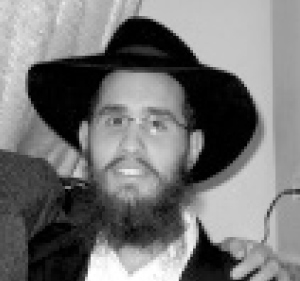“The truth is I started this mainly for myself. After living in Tzfas for a few years I suddenly got it. I said, “Wait a minute, the Rebbe chose you to be a Chabadnik and you came to a Chassidic community, wonderful. But is that all the Rebbe wants of you? What is the significance of being a Chabad Chassid if not to spread the wellsprings?””
 Name: Eli Levy
Name: Eli Levy
Age: 27
Married, two children
Lives: Tzfas
Profession:
Music teacher and maintenance manager at the Technical Institute of Tzfas
If you’ve been in the Chabad community of Tzfas on a Friday lately, you could not help but notice a higher level of inspiration and the sense of a greater support system among the men going on mivtza t’fillin. This is thanks to the Matteh Mivtza T’fillin that was recently started in the community by Eli Levy, a dynamic young man.
The Matteh has a list of the names of those wanting to go on mivtzaim and gives out locations, routes and hours, coordinates with the local ATaH bachurim organization to prevent overlap, and sends the men on their way.
Eli grew up in a religious-nationalist family. In his teens he became interested in Chabad and went to the yeshiva in Tzfas. After two years of learning in Tzfas he went on K’vutza, learned in 770, went on a year of shlichus to Mongolia and returned home. He married and settled in the Chabad community of Tzfas.
Matteh Mivtza T’fillin, a kind of ATaH organization for married men, is a fantastic idea that is needed in all Chabad communities. It’s the kind of thing you hear about and you say, “How come this wasn’t done sooner?” How did you get the idea?
We were sitting at a Sheva Brachos meal and I told a terrific Hashgacha Pratis story. The moral of the story was that you never know what effect a small action will have. People were inspired to do something and I had long felt we were losing out on the amazing strength of the young married men in the community. I took the opportunity and offered to start an organized system of mivtza t’fillin for the men of the community. We passed around a paper and everyone signed that they committed to going on mivtzaim once a week.
We put the page with the signatures into a volume of Igros Kodesh and opened to a letter where the Rebbe writes about a group that got together for the purpose of spreading the wellsprings. The Rebbe warmly encourages this. At the end of the letter, the Rebbe writes that since the people were present at a Sheva Brachos meal and making good resolutions, this would stand by the couple for a blessing for an everlasting edifice.
We were in shock. We certainly hadn’t expected such a precise answer. That week, we got started. We found out which hours and locations did not have bachurim and that is where we sent pairs of men to do mivtzaim.
Did it catch on?
Boruch Hashem, it’s been very successful. We started with a few pairs and now we have over twenty pairs of men who go on mivtzaim every week in Tzfas and the immediate area.
Every week our objective is to surpass what we did the week before with the number of people who put on t’fillin. Last week, for example, we put t’fillin on with 200 people, which is a huge amount.
What motivates you?
The truth is I started this mainly for myself. After living in Tzfas for a few years I suddenly got it. I said, “Wait a minute, the Rebbe chose you to be a Chabadnik and you came to a Chassidic community, wonderful. But is that all the Rebbe wants of you? What is the significance of being a Chabad Chassid if not to spread the wellsprings?”
I spent three years in the army where I did mivtzaim left and right, but here I was in a community and I thought, “What do I want my children to think of me? That I’m just a fellow living in the community?” So yes, the plan is to find a place of shlichus, but for now as long as I live in the community I have to do something for the Chabad neshama, for the chinuch of my children.